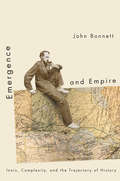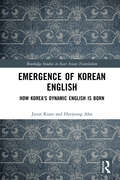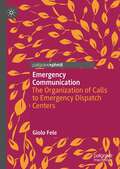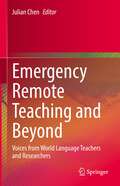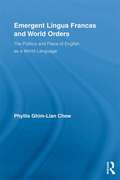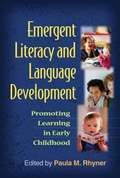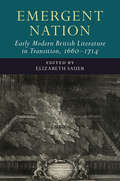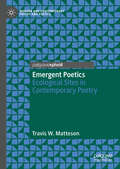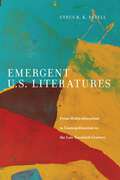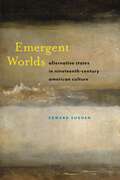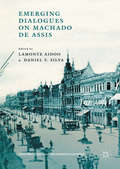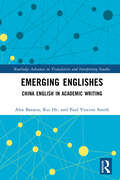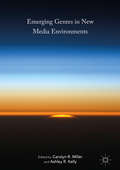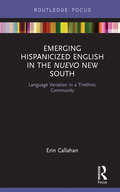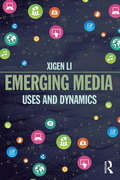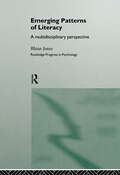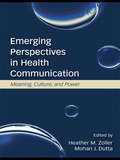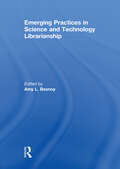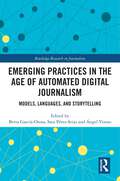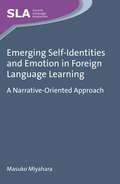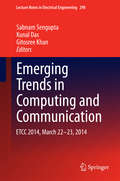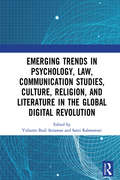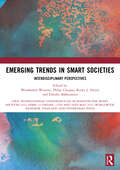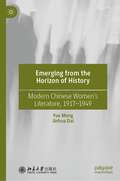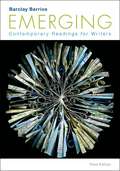- Table View
- List View
Emergence and Empire: Innis, Complexity, and the Trajectory of History
by John BonnettHarold Innis was one of the most profound thinkers that Canada ever produced. Such was his influence on the field of communication that Marshall McLuhan once declared his own work was a mere footnote to Innis. But over the past sixty years scholars have had a hard time explaining his brilliance, in large measure because Innis's dense, elliptical writing style has hindered easy explication and interpretation. But behind the dense verbiage lies a profound philosophy of history. In Emergence and Empire, John Bonnett offers a fresh take on Innis's work by demonstrating that his purpose was to understand the impact of self-organizing, emergent change on economies and societies. Innis's interest in emergent change induced him to craft an original and bold philosophy of history informed by concepts as diverse as information, Kantian idealism, and business cycle theory. Bonnett provides a close reading of Innis's oeuvre that connects works of communication and economic history to present a fuller understanding of Innis's influences and influence. Emergence and Empire presents a portrait of an original and prescient thinker who anticipated the importance of developments such as information visualization and whose understanding of change is remarkably similar to that which is promoted by the science of complexity today.
Emergence of Korean English: How Korea's Dynamic English is Born (Routledge Studies in East Asian Translation)
by Jieun Kiaer Hyejeong AhnEmergence of Korean English explores the dynamic nature of emerging Korean English and its impact on Korean society, culture, and identity. This book challenges the negative stereotypes and stigmatization of Konglish and argues that it has been a great asset for Korea’s fast economic development. The fate of Korean English has been transformed in the time of the Korean wave as the K-fandom actively engages with Korean English. The book offers a comprehensive overview of Korea’s encounter with the English language and provides an in-depth analysis of linguistic characteristics, pragmatic features, and cross-cultural and cross-linguistic aspects of Korean English. The authors examine the unique linguistic features of Korean English, including phonological, syntactic, and lexical features, and highlight the sociocultural implications of these features for Korean society. In addition, the book discusses the role of Hallyu fandom languages in the emergence of Korean English and the growth of Korean pop culture worldwide. It also provides insights into the English fever in South Korea and its impact on education, society, and culture. This book is a valuable resource for scholars, students, and professionals who are interested in the emergence of Korean English and its social, cultural, and linguistic implications for Korea and the global community.
Emergency Communication: The Organization of Calls to Emergency Dispatch Centers
by Giolo FeleThis book explores communication in emergency call and response centers, taking an approach drawn from Conversation Analysis to examine how call-takers answer calls and the ways in which dispatch is issued in different contexts. It offers an original contribution to the study of the organization of emergency calls, the ways such calls are treated, and some of the practical problems that emerge when dealing with them. The author offers a systematic review of studies in the international field of the organization of emergency calls, while at the same time providing fresh case studies, illustrated with empirical materials, taken from audio- and video- recordings of the everyday activities of call and response centers. This book will be of interest to students and scholars of social interaction and may be appreciated by all scholars and practitioners working on the social management of emergency situations, including in fields such as Sociolinguistics and Pragmatics.
Emergency Remote Teaching and Beyond: Voices from World Language Teachers and Researchers
by Julian ChenThis timely volume addresses issues pertaining to language teaching, learning and research during the pandemic. In times of a global emergency, the aftermath of emergency remote teaching (ERT) cannot be ignored. The question of how language educators and researchers unleash creativity and employ strategies vis-à-vis ERT still remains to be answered. With practitioners in mind, it covers a broad spectrum of educational settings across continents, target languages and methodologies. Specifically, it reveals viable ways of utilizing digital technologies to bypass social distancing while highlighting the pitfalls and challenges associated with crisis teaching and research. This volume comprises two parts: Teacher Voice vicariously transports readers to practitioners’ compelling stories of how teacher resilience, identity and professional development are crystallized in adaptive pedagogy, online teaching practicum, virtual study programs and communities of practice during ERT. The second part, Researcher Corner, showcases innovative approaches for both novice and seasoned researchers to upskill their toolkits, ranging from case study research and mixed methods designs, to auto- and virtual ethnography and social media research. The array of food for thought provides a positive outlook and inspires us to rethink our current practices and future directions in the post-COVID world. Regardless of their backgrounds and experiences, readers will be able to relate to this accessible volume that harmonizes research and practice, and speaks from the hearts of all the contributors.
Emergent Lingua Francas and World Orders: The Politics and Place of English as a World Language (Routledge Studies in Sociolinguistics)
by Phyllis Ghim-Lian ChewThis book presents an alternative paradigm in understanding and appreciating World Englishes (WEs) in the wake of globalization and its accompanying shifting priorities in many dimensions of modern life, including the emergence of the English language as the dominant lingua franca (ELF). Chew argues that history is a theatre for the realization of lingua francas, offering a model that shows the present as derived from the past and as a bearer of future possibility, the understanding of which is rooted in the understanding of World Englishes and ELF. The book will engage with some of the current theoretical debates in WEs and includes, as a means of fleshing out the model, sociolinguistic case studies of Arabia, China Fujian, and Singapore.
Emergent Literacy and Language Development
by Paula RhynerThis concise, accessible book explores the connection between language acquisition and emergent literacy skills, and how this sets the stage for later literacy development. Chapters address formative early experiences such as speaking and listening, being read to, and talking about print concepts and the alphabet. Written for early childhood professionals, reading specialists, and speech language pathologists, the book describes effective assessment and instructional approaches for fostering language learning and emergent literacy in typically developing children and those at risk for language delays. Vivid case examples illustrate specific ways to collaborate with parents to give all children a strong foundation for school readiness and success.
Emergent Nation: Early Modern British Literature in Transition, 1660–1714: Volume 3 (Early Modern Literature in Transition)
by Elizabeth SauerThe years 1660 to 1714 represent a fraught transitional period, one caught between two now dominant periodization rubrics: early modern and the long eighteenth century. Containing narratives of disruption, restoration, and reconfiguration, Early Modern Literature in Transition, 1660–1714 explores the conjunctions and disjunctions between historical and literary developments in this period, when the sociable, rivalrous textual world of letters registered and accelerated changes. Each of the volume's four parts highlights the relationship of various literary forms to a different kind of transformation - generic, ideological, cultural, or local. The five chapters in each section rigorously probe the conditions that affected the period's literary transformations, and interrogate the traditions that canonical and less established writers inherited, adapted, and often challenged. In making a case for an early mimetically produced English nation, this book, through its concentration on literary evidence and transitions also makes innovative contributions to an understanding of nationalism in the period.
Emergent Poetics: Ecological Sites in Contemporary Poetry (Modern and Contemporary Poetry and Poetics)
by Travis W. MattesonThis book proposes the term 'emergent poetics' to synthesize two divergent strands in contemporary literary media theory - the media archaeology of material inscriptions and the systems view of media ecology, which considers media as complex nodes of exchange. Emergent poetics emphasizes the speculative, non-prosthetic quality of media: the anthrodecentric perspective that media do not simply extend human senses, but instead consist of properties that exceed human apprehension. This study builds on Eve Kosofky Sedgwick’s theory of reparative reading, contemporary media theory, and Bruno Latour’s Actor-Network Theory, which are united in their skepticism regarding the paranoid “unveiling” gesture of institutional critique, their emphasis on methodology rather than theoretical ideology, and their insistence on assembling rather than deconstructing. In response to these three trends, this project begins by attending to what Jerome McGann calls the bibliographic code (material forms), while simultaneously expanding this medium specific perspective by situating written works within their broader media ecosystems, tracing interactions among media, humans, and nonhumans.
Emergent U.S. Literatures: From Multiculturalism to Cosmopolitanism in the Late Twentieth Century
by Cyrus PatellEmergent U.S. Literatures introduces readers to the foundational writers and texts produced by four literary traditions associated with late-twentieth-century US multiculturalism. Examining writing by Native Americans, Hispanic Americans, Asian Americans, and gay and lesbian Americans after 1968, Cyrus R. K. Patell compares and historicizes what might be characterized as the minority literatures within “U.S. minority literature.” Drawing on recent theories of cosmopolitanism, Patell presents methods for mapping the overlapping concerns of the texts and authors of these literatures during the late twentieth century. He discusses the ways in which literary marginalization and cultural hybridity combine to create the grounds for literature that is truly “emergent” in Raymond Williams’s sense of the term—literature that produces “new meanings and values, new practices, new relationships and kinds of relationships” in tension with the dominant, mainstream culture of the United States. By enabling us to see the American literary canon through the prism of hybrid identities and cultures, these texts require us to reevaluate what it means to write (and read) in the American grain. Emergent U.S. Literatures gives readers a sense of how these foundational texts work as aesthetic objects—rather than merely as sociological documents—crafted in dialogue with the canonical tradition of so-called “American Literature,” as it existed in the late twentieth century, as well as in dialogue with each other.
Emergent Worlds: Alternative States in Nineteenth-Century American Culture (America and the Long 19th Century #4)
by Edward SugdenReimagines the American 19th century through a sweeping interdisciplinary engagement with oceans, genres, and timeEmergent Worlds re-locates nineteenth-century America from the land to the oceans and seas that surrounded it. Edward Sugden argues that these ocean spaces existed in a unique historical fold between the transformations that inaugurated the modern era—colonialism to nationalism, mercantilism to capitalism, slavery to freedom, and deferent subject to free citizen. As travellers, workers, and writers journeyed across the Pacific, Atlantic, and Caribbean Sea, they had to adapt their political expectations to the interstitial social realities that they saw before them while also feeling their very consciousness, particularly their perception of time, mutate. These four domains—oceanic geography, historical folds, emergent politics, and dissonant times—in turn, provided the conditions for the development of three previously unnamed genres of the 1850s: the Pacific elegy, the black counterfactual, and the immigrant gothic.In telling the history of these emergent worlds and their importance to the development of the literary cultures of the US Americas, Sugden proposes narratives that alter some of the most enduring myths of the field, including the westward spread of US imperialism, the redemptionist trajectory of black historiography, and the notion that the US Americas constituted a new world. Introducing a new generic vocabulary for describing the literature of the 1850s and crossing over oceans and languages, Emergent Worlds invokes an alternative nineteenth-century America that provides nothing less than a new way to read the era.
Emerging Dialogues on Machado de Assis
by Lamonte Aidoo Daniel F. SilvaThe first book-length edited collection on Machado de Assis, this volume offers essays on Machado de Assis' work that offer new critical perspectives not only Brazilian literature and history, but also to social, cultural, and political phenomena that continue to have global repercussions.
Emerging Englishes: China English in Academic Writing (ISSN)
by Alex Baratta Rui He Paul Vincent SmithThis book encourages further conversation on the expanding circle in World Englishes, offering a detailed look at ‘China English’ through the academic writing of Chinese students at a British university.The volume seeks to blur the simplistic binary of ‘Chinglish’, a broad term often understood to encompass grammatical or lexical errors or seemingly ‘unnatural’ expressions, and ‘China English’, which the authors articulate here as its own variety, as evidenced in language use marked by predictability. The research framework begins with analysing student essays in one programme at the University of Manchester, predominantly made up of Chinese students. In highlighting recurring features and supported by online surveys of the students, the authors demonstrate how ‘China English’ displays the systematicity in grammar and lexis observed in varieties of English. In focusing on academic writing, a genre which bears prominence in assessment, the book raises key questions about implications for teaching, what is considered appropriate language, and whether, rather than seeking to replace ‘Standard English’, the notion of what is ‘standard’ might be broadened to encompass other varieties. The book further promotes implications beyond pedagogies, to include learning more broadly, marking, curriculum/policy, training, and identity negotiation.This book will be of interest to students and scholars in language and education, World Englishes, sociolinguistics, and applied linguistics.
Emerging Genres in New Media Environments
by Carolyn R. Miller Ashley R. KellyThis volume explores cultural innovation and transformation as revealed through the emergence of new media genres. New media have enabled what impresses most observers as a dizzying proliferation of new forms of communicative interaction and cultural production, provoking multimodal experimentation, and artistic and entrepreneurial innovation. Working with the concept of genre, scholars in multiple fields have begun to explore these processes of emergence, innovation, and stabilization. Genre has thus become newly important in game studies, library and information science, film and media studies, applied linguistics, rhetoric, literature, and elsewhere. Understood as social recognitions that embed histories, ideologies, and contradictions, genres function as recurrent social actions, helping to constitute culture. Because genres are dynamic sites of tension between stability and change, they are also sites of inventive potential. Emerging Genres in New Media Environments brings together compelling papers from scholars in Brazil, Canada, England, and the United States to illustrate how this inventive potential has been harnessed around the world.
Emerging Hispanicized English in the Nuevo New South: Language Variation in a Triethnic Community (Routledge Studies in Sociolinguistics)
by Erin CallahanThis volume provides a comprehensive overview of contemporary language shift and identity in a language community in the mid-Atlantic South to offer a unique window into ethnic dialect formation and sociolinguistic processes underpinning dialect acquisition. Drawing on data collected from over 100 interviews of members North Carolina Hispanicized English speakers in Durham, North Carolina, the book employs a quantitative approach and uses statistical software in analyzing the data collected to focus on the sociolinguistic variable of past tense unmarking to explore sociolinguistic processes at work in English language learner variation. The focus on a specific variable allows for the opportunity to explore specific processes in more detail, including the ways in which speakers accommodate regional and ethnic varieties of their peers and the internal and environmental factors guiding dialect acquisition. Illuminating new facets to the processes of language learning, language contact, and ethnolect emergence, this volume is key reading for students and researchers in second language acquisition and variationist sociolinguistics.
Emerging Media: Uses and Dynamics
by Xigen LiEmerging Media provides an understanding of media use in the expanding digital age and fills the void of existing literature in exploring the emerging new media use as a dynamic communication process in cyberspace. It addresses emerging media dynamics during the second decade of online communication, the Web 2.0 era after Mosaic and Netscape. The current status of emerging media development calls for extended exploration of how emerging media are used in different patterns and contexts, and this volume answers that call: it is a comprehensive examination of emerging media evolution and concurrent social interaction. This collection: Provides a comprehensive analysis of digital media use and online communication with empirical data Contains both theoretical and empirical studies, which not only test communication and related theories in the age of digital media, but also provide new insights into important issues in digital media use and online communication with significant theoretical advances Spotlights studies that use a variety of research methods and approaches, including surveys, content analysis and experiments This volume will be invaluable to researchers of communication and new media, and will serve advanced undergraduate and graduate students studying media and digital communication. With an international scope, it appeals to readers around the world in all areas that utilize new media technologies.
Emerging Patterns of Literacy: A Multidisciplinary Perspective (Routledge Progress in Psychology)
by Rhian JonesIn a unique study of parent-infant interactions at home, Rhian Jones analyses early reading with picture books and stories. Drawing upon psychology, linguistics and anthropology she provides a wide ranging and highly original account of the conversational 'rules' of reading dialogues, semantic knowledge and picture book reading, the ontogenesis of narrative and the construction and expression of the infant unconscious. This provides an absorbing and valuable account to all academics and practitioners concerned with language acquisition, literacy and early childhood development.
Emerging Perspectives in Health Communication: Meaning, Culture, and Power (Leas Communication Ser.)
by Mohan J. Dutta Heather ZollerThis volume provides the theoretical, methodological, and praxis-driven issues in research on interpretive, critical, and cultural approaches to health communication. It includes an international collection of contributors, and highlights non-traditional (non-Western) perspectives on health communication.
Emerging Practices in Science and Technology Librarianship
by Amy L. BesnoyThis book investigates the emerging practices of science and technology librarians specific to maintaining collections, providing access to resources, and ensuring that informed decisions are made regarding limited financial resources. Issues discussed include librarians becoming embedded in curriculum design and delivery, the continuum of librarian involvement, science literacy and the intersection with lifelong learning, integration of information literacy into science, technology, engineering and mathematics (STEM) curriculum, development of course-related instruction programs. In addition, chapters include the differentiation between locating and accessing content and the economics of access, data driven collection and retention decisions, social networking and the scientific community, the trend to merge IT with libraries, institutional repositories, and managing productivity.Each chapter considers the change that is occurring in and around the profession and together these chapters present a notable set of reflections on the changes that are necessary for science and technology librarians to thrive in the shifting information landscape. This book is recommended for scholars and professional librarians.This book was published as a special issue of the Journal of Library Administration.
Emerging Practices in the Age of Automated Digital Journalism: Models, Languages, and Storytelling (Routledge Research in Journalism)
by Ángel Vizoso Sara Pérez-Seijo Berta García-OrosaEmerging Practices in the Age of Automated Digital Journalism provides a detailed insight into the current state of journalism and its future challenges. The book brings together a global team of authors to review and analyse emerging practices in the automated digital scenario through which journalism is being reshaped, such as novel languages, storytelling forms, and business models. Providing a much-needed review of the field to apprehend the knowledge and experience acquired, the collection also offers an up-to-date overview of digital journalism today, outlining those trends pointing to the future of journalism practice and media in the online sphere. Through a multidisciplinary and international approach, chapters delve into the main technological changes that digital journalism has recently faced, closely related to digital native media, novel storytelling forms, social media, innovation, television broadcasting, new media management structures and procedures, content automation, fact-checking, web analytics, and social audiences. Offering new insights into this fast-developing area, this volume will be an engaging and vital resource for media professionals and researchers in journalism and communication studies, as well as those interested in contemporary journalism practice and communication technology.
Emerging Self-Identities and Emotion in Foreign Language Learning
by Masuko MiyaharaThis book uses a narrative-oriented approach to shed light on the processes of identity construction and development among Japanese university students of English. The research highlights the instrumental agency of individuals in responding to and acting upon the social environment, and in developing, maintaining and/or reconstructing their identities as L2 users. The study offers unique insights into the role of experience, emotions, social and environmental affordances in shaping their personal orientations to English and self-perceptions as English learner-users. It also examines individuals' responses to these factors and discusses fluctuations in their motivations. The additional value of this book lies in its detailed account of methodological procedures, challenges and ways to overcome obstacles encountered when undertaking qualitative longitudinal studies.
Emerging Trends in Computing and Communication
by Sabnam Sengupta Kunal Das Gitosree KhanThe book presents papers delivered by researchers, industrial experts and academicians at the Conference on Emerging Trends in Computing and Communication (ETCC 2014). As such, the book is a collection of recent and innovative works in the field Network Security and Cryptography, Cloud Computing and Big Data Analytics, Data Mining and Data Warehouse, Communication and Nanotechnology and VLSI and Image Processing.
Emerging Trends in Psychology, Law, Communication Studies, Culture, Religion, and Literature in the Global Digital Revolution: Proceedings of the 1st International Conference on Social Sciences Series: Psychology, Law, Communication Studies, Culture, Religion, and Literature (SOSCIS 2019), July 10 2019, Semarang Indonesia
by Yulianto Budi Setiawan Santi RahmawatiThe Fourth Industrial Revolution has the potential to raise global income levels and improve the quality of life for populations around the world. Technology development of AI, self-driving, big data, the Internet of things, and many digital revolutions have changed how people interact with each other. Therefore, developing a comprehensive and globally shared view of how technology is affecting our lives and reshaping our social, cultural, and human environments is essential. There has never been a time of more significant promise, or one of greater potential peril. Today’s decision-makers, however, are too often trapped in traditional, linear thinking, or too absorbed by the multiple crises demanding their attention, to think strategically about the forces of disruption and innovation shaping our future.The main goal of the conference was to provide an outlet for papers discussing the importance and impact of industrial revolution 4.0 to influence social aspect in human life. The proceedings consist of papers covering issues on psychology, law, communication studies, culture, religion, and literature. The proceedings will provide the latest research and constitute a concise but timely medium for the dissemination.The Proceedings of the 1st International Conference on Social Sciences Series (SOSCIS 2019) will be invaluable to professionals and academics in psychology, law, communication studies, culture, religion, and literature.
Emerging Trends in Smart Societies: Interdisciplinary Perspectives
by Worakamol Wisetsri Philip Clingan Rocky J. Dwyer Dilrabo BakhronovaEmerging Trends in Smart Societies: Interdisciplinary Perspectives” captures the essence of the groundbreaking initiative heralded by the inaugural International Conference on Humanities for Smart Societies 2023 (HMSS 23). This milestone event convenes a global cohort of scholars, policymakers, and thinkers, transcending geographical confines via a pioneering virtual platform.The book crystallizes the convergence of diverse disciplines – from humanities to management – fostering an exchange of innovative ideas vital for sustainable, digitally transformed societies. By orchestrating cross-disciplinary dialogues, this anthology unveils novel solutions and holistic approaches to contemporary challenges.
Emerging from the Horizon of History: Modern Chinese Women’s Literature, 1917–1949
by Jinhua Dai Yue MengThis book systematically studies the literary output of female writers in contemporary China within the frame of literary theories of feminism. With tools from psychoanalysis, structuralism and deconstructionism, the two female authors, Meng and Dai, analyze 9 important female writers from 1919 to 1949, including Yin Lu, Xin Bing, Ning Ding, Ailing Zhang. By decade, the authors provide a comprehensive depiction of these female writers' historic-cultural background as well as their reception by critics and audiences. Navigating the complex relation between mainstream literary trends and female writers’ practice, this text represents a landmark of practice of literary feminist criticism within the Chinese language.
Emerging: Contemporary Readings For Writers
by Barclay BarriosEmerging uses an inquiry-based approach and engaging readings to help students understand and write about a variety of academic texts. Based on reviewer feedback, the third edition uses its assignment sequences to pose questions about the important but unsettled issues that shape students’ lives, such as “How is technology changing us?” and “How can you make a difference in the world?” Thought-provoking, contemporary readings help them address those questions in a meaningful way. At its core, Emerging focuses on the skills necessary for academic writing in any discipline, and a thoroughly revised Part One offers concrete strategies for improving those skills: reading critically, synthesizing, arguing, using evidence, and revising. Twenty vibrant new readings keep Emerging in tune with the newest ideas that will challenge students to think beyond their own experiences—and beyond the classroom.
